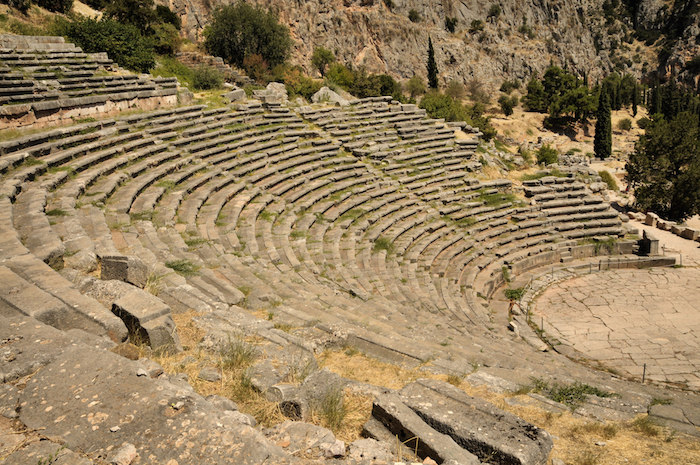Since the inception of Democracy in ancient Greece, theater has existed to keep it honest.
Thought by many scholars to have preceded democracy itself, theater was born to demonstrate the humanity of kings and politicians like Pericles, and provide catharsis for even the most marginalized of Athenian society.
Free and honest speech were central tenets of Athenian democracy, and the theater was its most fertile ground. “The Greek theater’s democratic character,” states Peter Burian, professor of classic and theater studies at Duke University, “is not so much a matter of taking ideological positions that are certifiably democratic, but of participating in a culture of democratic discourse and expanding it to make heard the voices of women, foreigners, and slaves who had no place in the political institutions of the polis.”
More than 2,000 years later, that same democratic character has now blazed forth on the stage of one of the most celebrated musicals in American theater history.
Vice-President elect Mike Pence, attending a performance of the Tony Award winning musical Hamilton on Broadway, was booed by the audience. The cast then read a statement during the curtain-call expressing their fears and concerns about the new administration.
Though Pence later said he was quite taken by the play, President-elect Donald Trump tweeted later that same evening, “This should not happen” and “They should apologize.”
These are troubling statements coming from a democratically elected American leader-to-be. Those same fundamental principles of free and honest speech so central to Athenian democracy, have for 230 years been enshrined and guaranteed in the Constitution of the Unites States of America, principles Trump will soon swear to uphold and defend.
The power that made theater such a valued element of Athenian democracy has historically made the artists who create it the targets of oppressive or totalitarian regimes. William Shakespeare knew this, and he was a master at cleverly navigating the politically volatile reins of both Queen Elizabeth I and King James I.
However, history is littered with the bodies of great theater artists who were not so fortunate, from Sor Juana Ines de la Cruz, the extraordinary 17th century Mexican nun whose plays and poems were condemned by the church for being too erotic, to V.E. Myerhold, the innovative 20th century Russian director who was secretly executed by Stalin around the same time that the great playwright Federico Garcia Lorca was executed in Franco’s Spain.
In this country during the 1940’s and 1950’s, Joseph McCarthy and the House Un-American Activities Committee attacked more than three hundred artists in publicly televised interviews and trials. These included many of the most respected playwrights, actors and musicians in American Theater history, from Arthur Miller, Lillian Hellman, and Clifford Odets, to Paul Roberson, Lena Horne, and Leonard Bernstein.
As recent as 2011, the internationally heralded Belarus Free Theater was forced to flee their country when constant threats from the KGB in Belarus made it clear they were no longer safe.
What is concerning about Trump’s comments is that they disparage and criticize not only the First Amendment, but also the relationship between theater and democracy that is as old as democracy itself. In arguably the greatest play ever written in the English language, Shakespeare has Hamlet in Act III sc.2 give a visiting troupe of actors advice about the purpose of the theater, and acting in particular:
“the purpose of playing, whose end, both at the
first and now, was and is, to hold, as ’twere, the
mirror up to nature; to show virtue her own feature,
scorn her own image, and the very age and body of
the time his form and pressure.”
As awkward as it may have been for Pence to be addressed directly as he was leaving that performance of Hamilton, he is a public figure elected to help lead a democratic society, and therefore open to public discourse, as they were in ancient Greece.
There is a long tradition of curtain speech in the theater, from casts collecting money for first responders and singing “God Bless America” immediately following 9/11, to casts that still regularly make curtain speeches and collect money for Broadway Cares/Equity Fights AIDS.
Speaking recently on Fox News, Pence stated that he did not feel an apology was needed, and that the boos aimed at him were simply what “freedom sounds like.”
No doubt the Founding Fathers so powerfully represented in Hamilton would certainly agree, as would Pericles himself.


